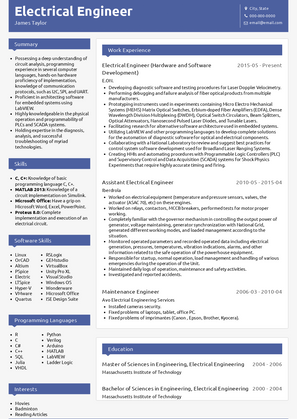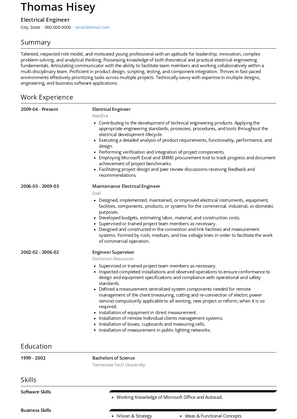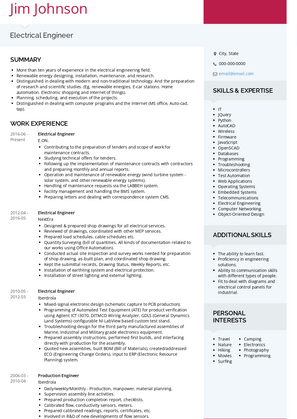3 Electrical Engineer Resume Examples and Templates for 2022
This page provides you with Electrical Engineer resume samples to use to create your own resume with our easy-to-use resume builder. Below you'll find our how-to section that will guide you through each section of an Electrical Engineer resume.



Overview
There’s no doubting that the field of electrical engineering is on the up - but with this high growth, and the salaries and benefits that follow, comes an abundance of highly qualified candidates all applying for the same jobs.
Our professionally designed electrical engineering resume samples will help you stand head and shoulders above the competition, commanding your future employer’s attention.
VisualCV has helped over 3 million prospective professionals achieve their career potential, so now is the time to get inspired and build your dream career.
Checkout our other related resume examples here:
- Engineering Intern Resume Examples
- Engineering Manager Resume Examples
- Engineering Resume Examples
- Executive Engineer Resume Examples
How to write a resume for an Electrical Engineer?
To write a great Electrical Engineer resume, follow these steps:
- Select the right Electrical Engineer resume template. Pick one that follows reverse chronological order.
- Thoroughly read the job description and customize your resume to show relevant experience and skills (e.g. display how you can design, develop and test to apply for a Systems Engineer position).
- While listing your work experience, make sure to add bullet lists instead of paragraphs to explain what you did.
- List all your electrical engineering skills in the skills section.
Advance your engineering career with a professionally crafted resume. Our engineering resume writing service showcases your technical expertise, project achievements, and problem-solving skills to help you secure top engineering roles.
Electrical Engineer Resume
A resume for an electrical engineer usually includes:
- A heading including personal information such as location, email, and phone number
- A resume summary detailing skills and accomplishments
- Work experience
- Skills
- Education
- Anything else relevant to the position or the job posting
For example, an electrical engineer’s resume may look like the following:
Summary
- Renewable energy designing, installation, maintenance and research expert
- Experienced in dealing with modern and non-traditional technology, and the preparation of research and scientific studies (Eg. renewable energies, E-car stations, home automation, electronic shopping and internet of things)
- Planning, scheduling, and execution of projects
Experience Electrical Engineer, E.ON. | June 2016 - Present
- Contributed to the preparation of tenders and scope of work for maintenance contracts
- Studied technical offers for tenders
- Followed up the implementation of maintenance contracts with contractors and prepared monthly and annual reports
- Operated and maintained renewable energy systems (wind turbine system, solar systems, and other renewable energy systems)
- Handled maintenance requests via the LABBEH system
- Facility management and handling of the BMS system
- Prepared letters and dealt with correspondence system CMS
Electrical Engineer, NextEra | April 2012 - May 2016
- Designed and prepared shop drawings for all electrical services
- Reviewed drawings, coordinated with other MEP services
- Prepared load schedules, cable schedules, etc.
- Quantity surveying (bill of quantities, all kinds of documentation related to our works using Office Automation)
- Conducted actual site inspection and survey works needed for preparation of shop drawings, as-built plans, and coordinated shop drawings
- Kept the submittal records, Drawing Status, Weekly Reports, etc.
- Installation of earthling system and electrical protection
- Installation of street lighting and external lighting
Skills & Expertise
- IT
-JQuery
- Python
-AutoCAD
- Wireless
- Firmware
- JavaScript
- OpenSCAD
- Databases
- Programming
- Troubleshooting
- Microcontrollers
- Test Automation
- Web Applications
- Operating Systems
- Embedded Systems
- Telecommunications
- Computer Networking
- Object-Oriented Design
Why it’s good: This resume describes both the day-to-day functions of the applicant’s previous roles as well as the more large-scale projects required of an electrical engineer. By using examples and featuring industry-specific terminology, recruiters can quickly identify this applicant’s strengths and determine whether they’d be a good fit for the role.
Senior Electrical Engineer Resume Example
A senior electrical engineer resume will contain many of the same components as the previous example, but, by definition, a senior electrical engineer generally has more experience or additional training. The key in a senior electrical engineer resume is to specify what separates you from applicants with less experience – why should your job title be senior electrical engineer rather than just electrical engineer?
A senior electrical engineer resume may look like the following:
Summary
- Possessing a deep understanding of circuit analysis, programming experience in several computer languages, hands-on hardware proficiency of implementation, knowledge of communication protocols, such as I2C, SPI, and UART.
- Proficient in architecting software for embedded systems using LabVIEW
- Highly knowledgeable in the physical operation and programmability of PLCs and SCADA systems.
- Expertise in the diagnosis, analysis, and successful troubleshooting of myriad technologies
Work Experience Electrical Engineer (Hardware and Software Development), E.ON. | May 2015-Present
- Developed diagnostic software and testing procedures for Laser Doppler Velocimetry.
- Performed debugging and failure analysis of fiber optical products from multiple manufacturers
- Prototyped instruments used in experiments containing Micro Electrical Mechanical Systems (MEMS) Matrix Optical Switches, Erbium-doped Fiber Amplifiers (EDFA), Dense Wavelength Division Multiplexing (DWDM), Optical Switch Circulators, Beam Splitters, Optical Attenuators, Nanosecond Pulsed Laser Diodes, and Tunable Lasers
- Facilitated research for alternative software architecture used in embedded systems
- Utilized LabVIEW and other programming languages to develop complete solutions for the automation of diagnostic software for optical and electrical components
Assistant Electrical Engineer, Iberdrola | May 2010 - April 2015
- Worked on electrical equipment (temperature and pressure sensors, valves, the actuator (ASAC 70), etc.)
- Worked on relays, contractors, MCCB breakers, performed tests to ensure motors were working properly
- Completely familiar with the governor mechanism in controlling the output power of generator, voltage maintenance, generator synchronization with National Grid, generated different working modes, and loaded management according to the situation
- Monitored operated parameters and recorded operated data including electrical generation, pressures, temperature, vibration indications, alarms, and other information related to the safe operation of the powerhouse equipment
- Responsible for startup, normal operation, load management, and handling of various emergencies during the operation of the Unit
- Maintained daily logs of operation, maintenance, and safety activities
- Investigated and reported accidents
Education Master of Science in Engineering, Electrical Engineering 2004-2006 Bachelor of Sciences in Engineering, Electrical Engineering 2000-2004
Why it’s good: This resume example provides countless concrete examples of equipment, processes, and technical expertise. A recruiter will immediately understand that this candidate knows what they’re talking about, and will be able to perform the duties and responsibilities required of an electrical engineer.
Select the Right Electrical Engineering Resume Format
With the average time spent looking at an electrical engineer resume lasting approximately 6 seconds, it’s essential to make that time count.
Follow the sleek and professional reverse-chronological resume format to highlight your biggest wins and achievements in the electrical industry, straight from the get-go.
Use big, clear headings and a clean font type like Arial when constructing your resume.
Exporting your electrical engineer resume in PDF rather than Microsoft Word will ensure that it looks clean and intact when being viewed by other professionals.
Best Way to Write Your Electrical Engineer Resume Summary
Consider this section as your elevator pitch to prospective employers. It gives you the opportunity to convince them to read on, instead of throwing your resume in the slosh pile with the rest, bidding farewell to your electrical engineering career.
If you are a highly experienced electrical engineer with years of experience in technical-management, testability analysis, communication systems and circuitry, make sure you highlight this as soon as possible.
Electrical Engineer Resume Summary
Possessing a deep understanding of circuit analysis, programming experience in several computer languages, hands-on hardware proficiency of implementation, knowledge of communication protocols such as I2C, SPI and UART.
Assistant Electrical Engineering Resume Summary Example
Proficient in architecting software for embedded systems using LabVIEW. 10+ years of experience of SCADA programming with a deep expertise in the diagnosis, analysis and successful troubleshooting of micro-mechanical systems.
Senior Electrical Engineer Resume Example - Sample
A great electrical engineering resume summary for the highly experienced is:
- Senior electrical engineer with 15+ years of experience and attention to detail.
- Deal proficiently in communication and mechanical systems on commercial and industrial levels.
- Proven success in upgrading old X system to C++, cutting testing time in half.
- Desire to bolster knowledge and experience in systems, technical-management and circuitry to maximize productivity.
- Willing to travel.
Here’s a sample that’s guaranteed to never get you past a first glance:
- Electrical engineer seeking big company.
- Skills in systems and management.
- Can work solo or in a team.
- No access to car but can travel if necessary.
If you’re an electrical engineer with less experience, or happen to just be starting out in the industry, we highly recommend using a resume objective to show your enthusiasm for the job, and to cover your lack of experience.
Junior Electrical Engineering Resume Objective Sample
Enthusiastic and professional entry-level electrical engineer. Designed and drafted electrical systems for three-storey apartment complex on university placement. Consulted with local fire department on efficient energy systems.
If it’s still a little early for you to be highlighting all of your impressive placement work, you could write an entry-level engineering resume that looks something like this (not recommended unless necessary):
Entry-level Electrical Engineering Resume Objective Sample
Junior electrical engineer seeking entry-level position. No experience in the professional world but am eager to learn. I possess great interpersonal skills and a growing knowledge of the industry.
How to Describe Your Electrical Engineering Work Experience on Resume
This is your real time to shine and show prospective employers your real, hands-on experience in the industry. Whether you’ve had decades of experience over mechanical, industrial or commercial roles, or are just getting your feet on the ground, be sure to showcase your best wins first.
Experience in electrical engineering can be valued in so many ways, so be sure to highlight where you’ve had success. Are you a pro in dealing with electrical failures? Have you designed emergency generator systems for big clients that have saved money?
We strongly recommend you take these four steps before listing your actual experience
- Highlight all of the qualities listed in the job add
- Ask yourself if you have proven that you meet these qualities
- List bullet points to make information easier on the eye
- Start with your most recent job
Highlight the company, your position and the dates involved. Then, without overloading too much, describe your duties and achievements. Quantify stats wherever possible.
Electrical Engineer Resume Experience
Electrical Engineer, Dolby | 2010 - present
- Managed the guidance, workflow and training of 10+ professional employees
- Drafted and reviewed circuitry designs that improved efficiency of systems by 25%
- Senior engineer for testability analysis
- Implemented executive plans in various work locations
Why it’s good: This experience entry is effective because the applicant has used concrete numbers and real-world examples to demonstrate what they’ll do in this role. It’s fine to tell employers that you have management experience, for example, but telling them exactly how you managed (guidance, workflow, and training) and how many people you managed (10+) will help recruiters quickly understand what you bring to the table.
Senior Electrical Engineer Resume Experience Tips and Example
Engineer Supervisor, Dominion Resources | February 2002 - February 2006
- Supervised or trained project team members as necessary
- Inspected completed installations and observed operations to ensure conformance to design and equipment specifications and compliance with operation and safety standards
- Defined a measurement centralized system components needed for remote management of the client (measuring, cutting, and re-connection of electric power service)
- Installed equipment in direct measurement
- Installed remote individual client’s management systems
- Installed boxes, cupboards, and measuring cells
- Installed measurement in public lighting networks
Why it’s good: This experience entry demonstrates the applicant’s seniority by describing their management responsibilities as well as their day-to-day job functions. Showing hiring managers that you’ve been successful in many different areas of your job is a great way to let them know that you’ve continued to grow within your career.
Top Electrical Engineering Resume Skills in Demand
In the digital era, recruiters and employers can just search for keywords in your electrical engineering resume. Not only is it really important to outline your engineering skills, it is also fundamental that they match the job description.
Prove your skills and let them shine in your electrical engineering resume: don’t forget, soft skills relate to qualities and hard skills are real, tangible and specific skills in your field.
Top Electrical Engineering Resume Skills in 2022
Hard Skills
- Programming (C/C++/Java)
- EIT
- Circuit design
- Electrical measurements
- Power transmission
- Electrical drives
- Power electronics
- Renewable energy fundamentals
Soft Skills
- Problem-solving
- Innovation
- Leadership
- Organization
- Decisiveness
- Attention to detail
- Creativity
- Accuracy
Listing Your Electrical Engineering Education on Resume
It’s important to know that your experience in electrical engineering goes far beyond the classroom. While it’s really important to highlight your tertiary qualifications, it is also handy to list any training courses that you’ve undertaken - they will give you a leg up on the competition and also highlight your willingness to continue learning. Make sure they fit the job description, though.
Most of all, include these pieces of information in your education section:
- Where you’ve studied
- What you’ve studied
- When you studied
- Any certifications you’ve earned (CAD, PLC, SCADA)
Make sure you that what you are telling your prospective employer is truthful. Even if you haven’t graduated yet, always let them know. You can indicate your willingness to improve your ‘professional practice’ - that’s a great way to say to avoid saying ‘education’ too much.
Electrical Engineer Resume Example - Education Section
Monash University BS in Electrical Engineering Focus on analogue and digital circuitry GPA 3.92 Pursued an independent study program in performance systems
Make Sure your Electrical Engineering Accomplishments Shine on Your Resume
When you’re describing your electrical engineering accomplishments on your resume, it isn’t always enough to simply state what you’ve done. What will really get a hiring manager’s attention isn’t necessarily what you’ve done, but rather how you’ve helped the company during your time at each job. Have you become your current job’s expert on a specific programming language? Are you responsible for training or mentoring new hires? Using those examples will give your accomplishments the attention they deserve.
How to Become an Electrical Engineer
Because electrical engineers work in many different fields and specialize in many different areas, there’s no one direct, sure-fire path each one takes. To become an electrical engineer, you’ll need at least a bachelor’s degree. Beyond that, you’ll need an extremely strong understanding of electronics, science, technology, computers, and design, as well as keen problem-solving skills.
The ways in which you can qualify as a licensed electrical engineer vary from state to state and within other regions. To become a Professional Engineer, or PE, you must:
- Complete a four-year degree in engineering from an accredited program.
- Pass the Fundamentals of Engineering exam.
- Complete four years of progressive engineering experience under a Professional Engineer.
- Pass the Principles and Practice of Engineering exam.
What Should You Study to Become an Electrical Engineer?
Nearly all electrical engineers have obtained a bachelor’s degree in electrical engineering. If you already know you want to become an electrical engineer, and you’re planning on attending college, an electrical engineering degree should be your priority.
If you already have an undergraduate degree, and it’s not in electrical engineering or a related field, you may not need to go back for an entirely new degree. If you have the skills and experience to successfully complete a graduate degree in electrical engineering, you may be able to qualify as an electrical engineer.
Electrical Engineer Salary
Because electrical engineers complete extremely technical work, undergo rigorous education, and go through a long process to become licensed, electrical engineers are usually paid quite well for their expertise. The average salary of an electrical engineer in the US is $90,000, according to Indeed.
Keep in mind that your salary will fluctuate depending on a number of factors. Most electrical engineers see their salaries increase as they progress through their careers – more seniority and responsibilities means higher salaries – and larger companies are usually able to pay their staff more.
Final Thoughts
If you have a technical mind and love to understand what makes things work, a career as an electrical engineer could be extremely rewarding. Whether you work for a large technology company creating new technologies for our personal devices, you create software that tracks flight maps for the military, or anything in between, electrical engineers work extremely hard to create the world around us.
With so much competition for the best electrical engineer jobs, however, you’ll need a resume that truly stands out from the pack. A VisualCV Pro membership allows you to create unlimited resumes, and gives you access to unlimited downloads to easily share your accomplishments.
Copyright ©2025 Workstory Inc.
